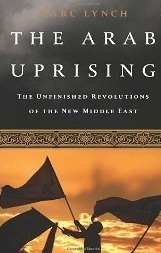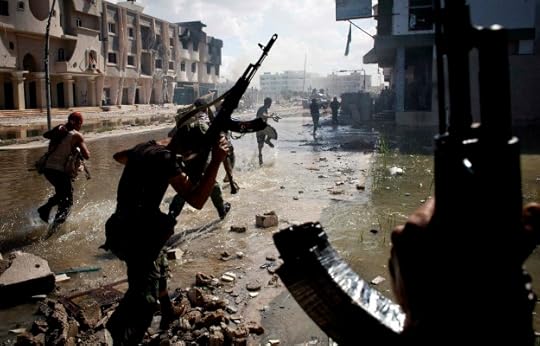Thomas E. Ricks's Blog, page 198
February 29, 2012
Tracking the 'Warrior Transition Btlns.'

Which increasingly appear to be dumping grounds
where soldiers are underappreciated, overmedicated, and then kicked out. Sample
quote from a military widow: "It seems like Dale became no use to the
military…He was treated no better than a dog on the street."
Congratulations to Greg Barnes and the Fayetteville Observer for staying
on this. Doing this kind of journalism is no fun but essential. I wonder
who will do it when newspapers disappear.
An Arab uprising happy hour

Come hear Marc
Lynch talk about his new book on the
Arab Uprising, then stay and have a glass of wine with your habibis whilst you get your copy signed.
But you have to register
first.
February 28, 2012
Are we already at war with Iran?

I suspect that we may be, in some way. Maybe a "shadow war."
Someone clearly is killing Iranian nuclear scientists. Someone is messing with
their centrifuges. They seem to be under cyberattack. Someone is helping ethnic
Baluchi rebels down in the southeast. And of course there are the less hidden
steps, such as sanctions.
No, it isn't traditional war, and it doesn't look like
anything John Wayne would want to star in. But put it all together and I do
wonder if we already are in some kind of war with Iran.
If I were still a hard-working daily journalist laboring in
the vineyard where the grapes of wrath are grown, I'd work on this issue
full-time, covering it on the assumption that there is a war going on in the
shadows. I'd try to cover it as it were a conflict, looking at the steps taken
and the countermeasures, at the major players, at the assumptions about the
other side. It would be tough to do but very interesting. And after a year or
so I'd have the makings of a good book.
As if Pakistan didn't have enough troubles -- and how Italy would handle the problem

Wild boars are roaming the streets of Islamabad at
night, and have even snuck onto the grounds of the presidential palace.
"The pig was
like a terrorist. We shot him down," said station chief Fayaz Tanooli. "I have
told the guards if another pig gets in then they will be dismissed."
Alternatively, the chief could huff and puff and bloooooow their
house down!
In Tuscany,
the locals would stew that boar for hours with garlic, tomatoes, chili peppers,
red wine, cloves, and fresh oregano, and then serve it tossed with papparadelle.
But then, the Italians probably better than anyone else know how to appreciate
life.
The Arab Awakening: Reconstruction, deconstruction or just construction?

By Greg McGowan
Best Defense department of think tank affairs
The United States Institute of Peace recently held
a briefing on the challenges of reconstruction in the post-authoritarian
nations of the Arab world. Here's the scorecard:
Tunisia: While hardly a free society
under longtime dictator Ben Ali, Tunisia did have some degree of institutions
and civil society in place. Tunisians must now build on this preexisting
framework to reconstruct their government apparatus on a level playing
field. Already, they have made some promising strides in this
direction. Legitimate general elections last October saw the Islamist
al-Nahda party (banned under Ben Ali) earn control of the Constituent Assembly
that will draft the country's new constitution. Democratic processes
began to crystallize soon thereafter, when secularist and leftist parties
joined with the Islamists in a coalition government. It appears that with
respect to governance, Tunisia is on the right track.
Many concerns will have to be addressed, however. Stimson Center President and CEO Ellen Laipson noted that for the first
time in decades, secularists are no longer protected by the exclusivist
policies of dictatorship; they must learn how to operate in a more open,
representative political environment. This means engaging and finding
common ground with Islamist parties whose views will undoubtedly conflict with
their own. Tunisian women are particularly worried, fearing that the
social equality they enjoyed under Ben Ali will be jeopardized by the new
Islamist-dominated coalition.
Egypt: This is a harder case. The SCAF, Egypt's "transitional" military government, has proven oppressive,
unreliable and staunchly unwilling to relinquish power. The military
government's ongoing detainment of U.S. and other foreign pro-democracy
activists is troubling, and underscores anxieties from Cairo to Washington over
the trajectory of Egypt's revolution. Ambassador William B. Taylor,
Special Coordinator for Middle East Transitions at the State Department, had
some stern remarks on the subject: "The Egyptians have a big responsibility now
to fix the current problem. Everything we do on assistance to Egypt
depends on solving this NGO problem."
Egypt is a test of deconstruction. Hosni
Mubarak dismantled Egyptian civil society, with his administration swallowing
up most of the country's institutions. He used the Emergency Law to
suspend the constitutional rights of all Egyptians, scaring his population into
silence and using his security forces to arrest, detain, torture and murder
Egyptians with impunity. Now the SCAF is preserving the old order. Before any genuine progress can be made, this paradigm must be deconstructed
and a new understanding must be built between Egyptian state and society.[[BREAK]]
But the adverse circumstances in Egypt are not
grounds for overreaction or taking sides by Washington, Laipson cautioned,
which will lead only to alienating parties whose partnerships must be preserved
in the long term. This includes the Muslim Brotherhood and other Islamist
parties, who won 70 percent of seats in Egypt's recent elections. The U.S. must
put its reluctance aside and confront the reality that Islamic values are, and
will continue to be, central to the populations of every nation impacted by the
Arab Awakening. Laipson and Taylor agreed that the rise of Islamist
parties did not necessarily signal "a repudiation of secular government." The Islamists were not the agents of change. The revolutions were not
about religion. The fact is, Islamists are connecting to major segments
of their populations on universal ideals like fairness and responsive
governance. This dynamic did not seem to trouble Ambassador Taylor, who
estimated that the pragmatists within the Islamist parties would ultimately
prevail. Put simply, their concern for what happens once they actually
take power and have the responsibility to govern will compel them to partner
with the U.S. and integrate into the international community. In the
meantime, however, Washington must understand its limits in Egypt -- that it is
not viewed very positively and that its reform efforts are not necessarily
going to be well received.
There are still practical ways to facilitate
reconstruction in Egypt and advance U.S. interests without being viewed as
meddling in its domestic politics. The country is in dire economic
straits, and desperately needs U.S. assistance to divert what Taylor called
"financial collapse." Indeed, it was a troubled economy that drove many
Egyptian poor to the streets in the first place, and a troubled economy will
undoubtedly undermine any future political or social progress. The U.S.
should therefore focus its short-term efforts in Egypt on improving economic
conditions, working together with the World Bank, IMF and the international
business community.
Libya: The panel participants seemed
encouraged about the prospects for reform in Libya, as economic conditions in
the country have improved markedly. Even so, Libya presents a unique
situation in that it requires wholesale construction of electoral and civil
institutions. Rule of law must be established from the ground up, and
supported by a legitimate law enforcement apparatus and judicial system.
Libyans have demonstrated a tremendous amount of
pride and resourcefulness and taken impressive strides towards construction of
a nation they can finally call their own. They are aided by several
factors. As Taylor noted, the country is "resource blessed." Funds
frozen under the Gadhafi regime are thawing and being appropriated for Libyan
society, while oil and gas production is expected to reach pre-revolution
levels by year's end. Given its small population of only around 6.5
million, domestic revenue streams should be able to directly impact the
construction of Libya's new society. Rather than pouring money into the
country, the U.S. can best serve the Libyan people by helping to maximize the
efficiency of state-building initiatives. Technical assistance will be
extremely valuable in Libya leading up to, and following, the general elections
slated for June.
Last week the Obama Administration submitted its FY
2013 budget request, which included a $770 million Middle East and North Africa
Incentive Fund. Ambassador Taylor, who will play a key role in the
implementation of the fund, described it as a flexible mechanism that will
allow the U.S. to provide concrete support for real reform. The issue, he
went on, is that "we don't know where the plane is landing. We're not
flying these planes, we're just giving advice to the pilots."
February 27, 2012
Quote of the day: Syrian regime digs in

Nir Rosen emerges from two months in Syria with
some sobering
conclusions:
--
Security
officials I have spoken to do not seem particularly distressed by the fact
that half the country has risen up against them.
Early on, the administration hesitated at the crucial moment and didn't kill
enough people to crush the uprising in a single blow. Now there is no turning
back.
... this struggle can drag on for years. The
regime knows that Russia, Iran and Iraq will back it to the end."
--
The Foust vs. Broadwell feud: A few thoughts from a major at West Point

By Mike Erwin
Best Defense guest commenter
Audacity: Boldness or daring,
especially with confident disregard for personal safety, conventional thought,
or other restrictions. In this sense, audacity is associated with bravery and valor. Members of our Armed Forces have demonstrated
audacity in Iraq and Afghanistan over the past decade.
But then there is another type of audacity. Effrontery or insolence; shameless boldness. In some ways, this is 180 degrees different
from the audacity described above. Some
recent comments by Mr. Josh Foust in his Registan.com
blog fall into this category.
Although he reviewed All In: The Education of General
David Petraeus, Mr. Foust proudly blogged that he did not actually
purchase the book. Instead, he took
pictures of what he deemed to be relevant pages. Mr. Foust went one step further and attempted
to justify his decision to not buy the book because, "I find her marketing
scheme of donating some of her proceeds to the Wounded Warrior Project
completely classless. Since I didn't want to punish the WWP by not buying her
book, I instead donated $100 to the project as an apology. And that's way more
than they would have gotten with a single extra book sale anyway."
The first problem here is that Mr. Foust did such little research
into what charity Paula Broadwell is supporting that he donated his money to a
different organization. He read the words "wounded warriors" and
didn't even go to her webpage to learn more about that organization. If he took one minute to investigate, he
would have learned why Paula's decision to support Team Red, White and Blue (www.TeamRWB.org) is not a marketing ploy. He would have understood why it is personal
and means a lot to her. For all readers
out there who want to take that few minutes, I'd urge you to do so by following
this link.
Problem number two for Mr. Foust is an even bigger one:
misrepresenting someone without conducting due diligence. To use the phrase "a
classless marketing scheme" without data or research to back it up is not only
disrespectful, but it's flat-out inaccurate.
And followers of Mr. Foust's blog should be alarmed as they traverse the
ensuing paragraphs.
As the founder and director of Team Red, White and Blue, I have
spent considerable time talking to Paula about the challenges this generation
of veterans is facing. And I know how
much she cares about making a difference.
If Mr. Foust had spent some time looking into Paula's involvement, he
would have learned a few facts that might have prevented him from making such
audacious, unfounded comments. So what
else has Paula done or is she doing to support this generation of veterans?[[BREAK]]
Since she left active duty, Paula has continued to support those
who serve and especially those who bear the wounds of serving. She's an advisor to Service Nation. Until she left to embed in Afghanistan, she
was a two-year board member of Carolina's Freedom Foundation -- which works to
inspire patriotism and recognize those who have served, especially wounded
warriors. Paula directly supports the North Carolina chapter of the USO and is
now working with the USO at the national level; she is working with them on
public service announcements and will write articles for their magazine, On
Patrol.

But let's bring it back to the past six weeks and All In. Prior to her airtime on high
profile national media outlets to talk about the book, I have seen the email
traffic where she has successfully requested to use some of that air time to
discuss Team Red, White and Blue and our organization's vision for support Iraq
and Afghanistan veterans. This includes
interviews on MSNBC's Morning Joe, Fox and Friends and Christine Amanpour's
show -- to name a few. Her challenge to
Jon Stewart on The
Daily Show not only garnered a $20,000 donation from him, but also
highlighted the role that physical fitness can play for wounded veterans to
overcome the psychological wounds of war.
Mr. Foust boasted about donating $100 and while that is a great gesture,
it's very different than the $20,000 that Paula has pledged to donate to Team
RWB to match Jon Stewart -- and the additional thousands of dollars her current
and future book profits will provide for veteran support organizations. Mr. Foust's research missed that.
Paula is consistently using national media platforms to draw
attention to the critical issues amongst this generation of Veterans. Approximately half a million veterans who
have served in Iraq or Afghanistan are struggling psychologically. For the
United States to effectively support these men and women in the coming decades,
we truly need to go "all in" to make it happen.
We need to do a better job of connecting with these men and women, right
in the communities where they live. We
need to spend time with them, to learn their story and understand their
sacrifice; and we need to inspire them to live a healthy lifestyle and
exercise. Team RWB is an all-volunteer
organization that is rising to meet these challenges head on. Progress is slow, and we have a long way to
go, but earnest support from people like Paula Broadwell is making it
possible. So please forgive my
irritation at reading an uneducated blog post from Mr. Foust that somehow
transforms passion and hard work into "classless" and "a marketing
scheme."
Instead of taking pictures of certain pages of All In, I would
recommend that Mr. Foust actually buy the book, read it -- and take notes about
what real leadership looks like. I'm
confident that he would learn something about the importance of relying on the
facts before making an assessment -- and about character.
Audacity. Mr. Foust has a
lot of it. I'll leave it to you to
decide how to classify it.
Mike
Erwin is the founder and director of Team Red, White and Blue. He is a Major in the Army and teaches
psychology and leadership at the U.S. Military Academy at West Point. He holds a M.S. in Personality Psychology
from the University of Michigan. Views
and opinions expressed here are those of the writer and do not reflect an
official position of DOD, the Army or West Point.
The Foust-Broadwell feud: He responds
By Joshua Foust
Best Defense guest respondent
I appreciate MAJ
Erwin's service to our country. But I would also appreciate his portraying
my comments accurately. I never claimed to "review" Paula's book (and
in fact say very specifically that I did not). While he can proclaim me
shameless, I find a certain shamelessness in ignoring 1500 words about Paula
Broadwell's many problems with telling the truth, presenting that truth
accurately and consistently over time, or portraying her critics fairly.
Rather than focusing on a throwaway line at the end of a
long analysis of a small anecdote in Paula's book, MAJ Erwin chose instead to
take exception at my donating money to the Wounded Warriors Project with the
wrong rhetoric attached to it. That's certainly his right, and he has every
right to assume my motives to feel outrage.
But the decision to focus on such a small point -- literally
my decision to donate to an organization supporting wounded veterans so I
wouldn't deny them a small royalty check by not buying Paula's book -- while
ignoring the much bigger points about Paula's issues with telling the truth is
worrisome. Either Paula told a false version of what happened at Tarok Kolache
on this blog last year, or she is telling a false version of what happened in
her book. The two do not match, and it would serve EVERYONE interested in
character and leadership, like Major Erwin, to contemplate that as well.
The real issue here isn't whether I donated to the Wounded
Warrior Project with the right motives, but whether Paula Broadwell is telling
an incomplete version of the truth to tell the story she wanted for her
hagiography of General Petraeus. No matter what people like Major Erwin try to
deflect attention from that point, it doesn't change the real issue here.
Having fun with airplanes and paint

A friend at the Pima Air and Space
Museum in Tucson, Arizona, sent along that photo of "The
Boneyard Project," in which artists have been given old aircraft to
decorate as they see fit.
Here is another one:

February 24, 2012
'It is not in the American national interest to go to war against Iran anytime soon'

So I ran into a friend who knows a lot about U.S.
policy and Iran.
We sat down on a park bench and this is what he told me:
--
The worst possible thing to do is go to war with
Iran. The key is the people -- and they are sick of the mullahs. Right now the
pressure is working to separate the people from the regime. A limited strike
would undercut all that.
Also, any attack would cause us to maintain a
heightened, more expensive defense posture, and give them moral standing to
retaliate.
So an attack is counter to all our long-term
objectives. We are having more effect right now through economic pressure than
ever before.
There is no doubt [that there is a huge divergence
between U.S. interests and those of Israel].
We want to stop Israel
from attacking so the issue is how to persuade Israel that we are serious about
stopping Iran from having a weapon-like a congressional finding that we will
take all steps necessary to stop Iran. It means we will define red lines that
can't be crossed.
But the bottom line is, I don't know a single person in government, civilian or in uniform, who
thinks it is in our national interest to go to war with Iran now.
If we do go to war, it will not be small. Iran
could reconstitute its nuclear program in
maybe five years, but if we go after its abilities to project military
power, we'd open a 15-year window."
--
Thomas E. Ricks's Blog
- Thomas E. Ricks's profile
- 436 followers



